#the gorgons
Text
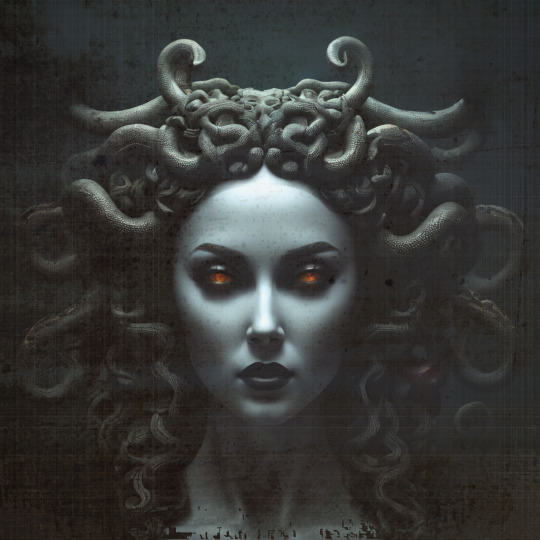
Medusa, one of three sisters known as the Gorgons, a chthonic monster in tales from Classical Antiquity, whose gaze turned men to stone.
#medusa#medusa's gaze#classical antiquity#Medusa#one of three sisters known as the Gorgons#a chthonic monster in tales from Classical Antiquity#chthonic#hellenic mythology#the gorgons#ancient world
47 notes
·
View notes
Text
Top 10 reasons why I shouldn't have to make eye contact with people I don't want to-
1: I don't know if they're a gorgon? Like a direct descendant of Medusa, like what if chrysaor has a direct line to this roadman in front of me and he just so happened to inherit his great great great x however many greats grandma's eyes??? Like I don't wanna be turned to stone, what if I'm wearing a shitty outfit, and my hair isn't working, I want the people who inevitably use me as a garden gnome to know I'm emo thank you very much.
#greek mythology#Medusa#chrysaor#the golden warrior#Perseus#the gorgons#eye contact#statue#garden gnomes#tbh I'm short enough to be a garden gnome#gnomeo and juliet
10 notes
·
View notes
Text
Stheno's Lament
I must apologize to you, little sister,
for everything I could not save you from:
Poseidon's hands,
his will, like the riptide, inescapable;
Athena's cruel punishment,
for she will always be a goddess first,
and a woman second;
Perseus' blade, and the underhanded trickery
which allowed the iron to kiss your throat.
We could not catch him,
Euryale and I,
but we tried,
beloved sister,
please know—
you must know that we tried.
You, the youngest of us,
should not have had to endure such torments;
were the Fates kinder, I could have protected you,
turned the Sea's grey eye away from you,
and bore the weight of it
myself.
You must know that
could I have spared you your suffering—
all of it,
any of it—
I would have.
Darling sister,
I swear to you I would.
I swear to you I tried.
I'm sorry I could not help you,
protect you,
save you,
avenge you.
Failing all else,
dear sister,
Medusa,
I love you.
18 notes
·
View notes
Text

Perseus takes the head of Medusa.
#vintage illustration#illustration#illustrative art#mythology#greek mythology#cretan bull#greek myths#myths and legends#mythical creatures#medusa#classical mythology#the gorgons#perseus
3 notes
·
View notes
Text
The riven vale, the Gorgon eyes of Truth,
The prayerless vigil and the cry for prayer.
— Oscar Wilde, The Ballad of Reading Gaol and Other Poems, (2010)
4 notes
·
View notes
Text
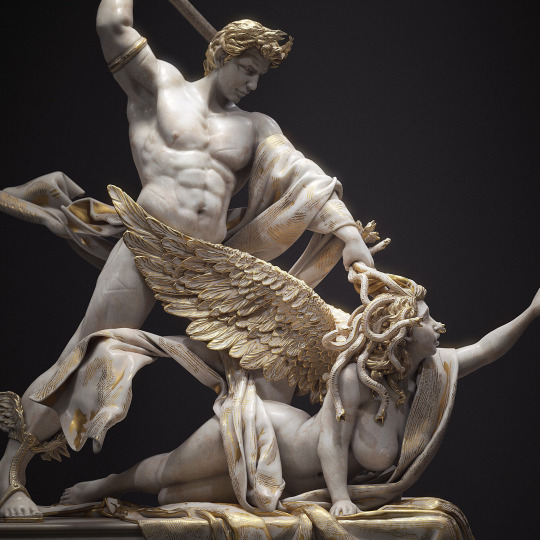
Medusa and Perseus by DocZenith. Source: DocZenith website
Perseus, Part 2
Hermes also helped Perseus, giving him an adamantine sickle with which to cut off Medusa’s head. But Perseus still needed a pair of winged sandals, a magic wallet to contain the decapitated head, and the dark helmet of invisibility which belonged to Hades. All these things were in the care of the Stygian Nymphs, from whom Perseus had to fetch them. (Perseus, The Greek Myths by Robert Graves, p 239).
Perseus located the Nymphs by outwitting the Gorgons’ sisters, the Graeae, three strange creatures who shared a single eye and tooth. By seizing both when they were being passed between the Graeae, Perseus refused to return tooth or eye until the sisters revealed the location of the Stygian Nymphs. They reluctantly did so and the hero swiftly collected wallet, sandals and helmet from the Nymphs. Perseus then flew to the land of the Gorgons. He confronted Medusa, and avoided her fatal gaze by locating her in the reflection of his polished shield. As Medusa approached him, Perseus then removed the Gorgon’s head with an arcing blow of his curved sword. To his surprise the mighty horse Pegasus emerged from her dead body, the steed being the offspring of Medusa and Poseidon. The other Gorgons emerged to avenge their fallen kin, so Perseus fled, dropping Medusa’s head into the wallet and mounting Pegasus to fly him away from that infernal place.
4 notes
·
View notes
Text
Children of The Gods: Chapter One
Note: This is the first chapter of a novel adaptation of the myth of Perseus and Medusa with elements of Ovid’s Metamorphosis
~~~~~~~~~~~~~~~~~~~~~~~~~~~~~~~~~~~~~~~~~~~~~~~
No one questioned it when Ceto and Phorcys, who had produced strange children such as Echidna, Stheno, and Euryale, produced a daughter like Medusa. She was a nymph of splendid beauty, with strong legs, eyes like honey, and most lovely of all, bronze ringlets of hair that came all the way down her back with nary a split nor flyaway. She was the envy of other nymphs. Each day, as she swam and played in the Aegean as many nymphs do, she attracted many admirers and suitors.
One day, yet another suitor approached her, a man just a little younger than she was. He approached her with a coral branch and asked her with all a gentleman’s tact, “Medusa, bronze-haired and strong-limbed daughter of the sea, please take this coral as a sign of my affection.”
Medusa, who had been standing in a tidepool and observing the creatures who dwelled in them at low tide, looked at the youth before her. He was handsome, that was for sure, despite being no older than 20, with fine but copious blond hair, a somewhat muscular build, and sun kissed skin. but it meant little to her when she was immune to such looks. In fact, she saw more beauty in the coral he carried than in any of her suitors. Its pink hue and elegant shape made her eyes widen. She took the trinket in her hand and felt its weight, the pricks of sharp, once living stone against her soft skin.
She told the youth, “It’s lovely, but I don’t even know your name, stranger. How am I supposed to accept the affections of someone who doesn’t even introduce himself?” She gave him an amused smile, her voice holding no venom.
The young man flushed and looked at his feet, telling her, “I-I, well, it’s Chrysaor, son of—"
Medusa raised a hand, bidding him to stop. “I don’t need to know where you came from, Chrysaor. I can tell that you don’t mean any harm . Come, I have an idea.” She stepped out of the tidepool, and he followed.
She told him, “I haven’t said yes to anyone else, but you seem nice, so I’ll give you a chance. We’ll make a game of it. If you can win a race from here to the olive tree in the city, I’ll let you court me. If I win, I get to keep the coral branch. Does that sound fair?”
Chrysaor nodded.
Medusa smiled and stashed the branch among the rocks. She got into position and waited for her hopeful suitor and opponent to join her. He had seemingly grown a bit of confidence, thinking his height would give him an advantage over the nymph. Medusa, keeping her promise to be fair, shouted, “One, two, three, GO!”
And then Medusa was off, speedy as an arrow. Her knee-length chiton ensured she wouldn’t trip over herself. Though the sand was full of shells, she barely felt them. She heard Chrysaor behind her, quickly catching up to her with his long strides. Medusa merely laughed and pushed herself harder, kicking up wet sand behind her.
They didn’t stay on the shore long, however, as their goal was the olive tree. Medusa turned and ran up the dunes. The sand was hot here, the shrubs dry and sad from the salt. The stillness a stark contrast to the amount of sand Medusa kicked up. When she looked back, she saw that Chrysaor was far behind, but did not falter, keeping up her pace and arriving in the city.
Medusa, despite being born and raised in its waters, had never been to Athens proper. As a nymph, she had no need to be in civilization and thrived in the wild. This is why it was hardly a surprise when she slowed down to observe the people milling about. People bought food from stalls and went in and out of great stone buildings, the women in chitons down to their ankles and the men with covered chests. It was only when her opponent started to come into sight Medusa sped up again, going as fast as her legs could carry her. Though she did not know the exact layout of Athens, she knew the general location of the tree from what others told her. Speed was thus the most important factor in her victory.
After her last sprint, her legs burning along with her lungs, Medusa finally found herself at the great olive tree. It was the city’s pride and joy, and she could understand why it was so. Athens was a young city, full of vigor and beauty, but young. Thus, so was the tree, yet it was both very tall and quite thick, its branches burdened with olives begging to be picked. Attendants watered it, pruned it, treated it like the precious thing, no, being it was. Medusa was so in awe that she barely noticed the salt spring bubbling and gurgling nearby, made by Poseidon, the lord of the seas in which she grew up. She even reached up to try and pluck a particularly fat, round olive, shiny and black, when an attendant grabbed her wrist. “What do you think you’re doing, young lady?”
Medusa, realizing her error, quickly snatched her hand back. “Forgive me. I simply saw such beautiful olives and wanted to try one.”
“Well, perhaps you should think before you reach,” the attendant said. She had gray eyes. “It isn’t right for you to pick any fruit you see off of just any tree. Especially not a tree from a goddess.”
“Right, Athena.” Medusa had heard all about what happened on that day, how when Poseidon had returned to his domain, he had declared it unfair. If one was to become a patron of a city, then shouldn’t their gift reflect the god, and not be some common tree? “It’s not much of a gift, then, is it, if it can’t be used by the city, and olive trees grow everywhere.”
“Why, of course we allow the tree to be used by the city. We use the olives to make the purest of olive oil for libations, the olives themselves for feeding the priests, the leaves for crowning heroes, and the wood from its daughters for boats and houses. On the other hand, what use does a saltwater spring have, wonderous though it may be?”
Medusa had no answer for that. She merely understood that mortals couldn’t drink salt water. She saw no way they could make use of it besides playing and perhaps cleansing one’s hands. She did, however, have a question. “May I try one?”
“You may, though you sea nymphs are truly sheltered if your intention was to eat a single raw olive.” The attendant walked away and came back with a brined olive instead. It was equally as large as the one Medusa wanted. The nymph popped it into her mouth, minding the seed as she chewed. It was salty but also savory with the slightest hint of bitterness.
“Thank you,” Medusa said. Just as she was about to take the pit out of her mouth, Medusa was slammed into, forcing her to spit it out instead. It was, of course, her suitor who had run into her.
“What is wrong with you?” she demanded to know as she turned around.
Chrysaor backed off, apologizing as he caught his breath. “I-I’m sorry, you— you just found a much shorter path somehow. I had to go as fast as I could.”
“Well, you should apologize to the attendant, then. You just made me spit at her feet!”
“What attendant?”
“The one in front of me, of course!” However, when Medusa turned around to give her apologies, she found that the attendant had seemingly vanished without a trace. After blinking twice and staring at the empty space for a moment, she turned around. and said to Chrysaor. “Well, either way, I’ve won, so it seems you owe me that coral branch.”
“It seems that I do,” said Chrysaor without a fight. “I’ll leave you alone from now on, don’t worry.”
“Well, I never said you had to do that,” Medusa said as he started to walk away.
“What?”
“You heard me. I said if you lost that you couldn’t be my lover, not that you couldn’t be my friend.”
Chrysaor perked up at that. “Alright, then, we can be friends.”
Thus, Medusa didn’t spend the day among the beasts of the ocean but in the world of men. She ate lamb instead of snapper, danced on stone instead of sand, and felt as though the sun were gentler.
At the end of the day, Chrysaor brought Medusa to the temple of Pallas Athena. She saw the priestesses there ensuring the statue was in good shape, delegating servants, and praying both for people who asked and for themselves.
“They look so happy,” Medusa said.
“I expect they would be. It’s an honor to work in our patroness’ house,” Chrysaor said.
“How do they become priestesses?”
“They tell their fathers they don’t want to get married yet, then they come here and train.”
“I see. And they take a vow of chastity?”
“Just as our lady did. They honor their vows for as long as they’re priestesses.”
“Interesting.”
When they were done in the temple, Medusa recovered her prize and waved her new friend goodbye before walking into the ocean, heading home. It was nearly dark, after all.
The wonderful thing about being an oceanid nymph was breathing underwater, Medusa thought. She did not do it nearly enough, but when she did, she saw all the colors of the sea creatures, the pinks and greens and violets. She could feel the currents against her legs.
When she resurfaced at her parents’ cave home, putting her now wet hair behind her ear, she placed her branch down and climbed up onto the shore.
“Good evening,” her mother, Ceto, greeted her, pulling her up onto their little island. “Where did you get this coral branch?” the primordial sea goddess asked.
“Oh, this.” Medusa looked at it as she squeezed the water out of her hair before picking it up. “I won it in a wager against a mortal. He ran against me in a footrace, and I won.”
“I see, and what was the wager if you lost?”
“He would be allowed to court me and nothing more.”
Ceto shook her head. “Medusa, you can’t toy with men like that. Such wagers can be dangerous, and it hurts the men who don’t mean you harm.”
“I didn’t hurt him, Mother. Besides, he’s my friend now. He even showed me the temple in the city while we were out today.” She walked into the cave properly, putting her prize up against the wall.
“Well, don’t wager like that again. Your heart and your honor are worth more than some trinket. At least accept your losses.”
“Yes, Mother.”
Phorcys looked up from his pool in the cave floor. Phorcys, unlike his wife, had no legs but a long eel’s tail. Thus, he was bound to water. In fact, their home had a pool for him within the cave, deep, so deep that it almost seemed endless and wide enough for him to not only stretch out, but perhaps do so twice, though he preferred to have his tail striking out. He heard what his wife and his daughter spoke of. “Speaking of suitors, Nerites came looking for you.”
Medusa made a face as she looked at her father, unable to hide her disgust. “Father, Nerites looks like a little boy. Please don’t tell me you arranged for him to meet with me.”
“Don’t be cruel, Medusa, he can’t help it,” Ceto scolded.
Phorcys ignored this outburst. “He only means to meet you properly. The boy means no harm.”
“It’s not just that he looks the way he does, though,” Medusa countered. “He’s arrogant and boastful.”
“And yet he’s also Lord Poseidon’s own charioteer. That alone would make him a fine match for you.” Phorcys pointed out.
Medusa looked between her parents, trying to think of a response. “Does he expect an answer right away?”
“I told him that you needed to make sure you had no other obligations.”
Medusa sighed. “Well, I was going to spend time with Stheno and Euryale on their island in two days, but other than that, I have none. But why did you answer for me, Father? You said I could choose my own suitor.”
“And in the time since I have allowed it, you have not let even a single suitor try to impress you.”
“Because none were suitable.”
“Are you saying the son of Nereus is unsuitable?”
“No, I’m saying that I don’t even know him.”
“That’s exactly what this meeting is for, Medusa. I am not arranging your wedding, I’m merely trying to help you. Will you at least give him a chance?”
Medusa looked to her mother and, finding no help, told her father, “I’ll give him a chance, then.”
The next day, Medusa set out, needing to distract herself from this business. She chose to go to Athens, her head above water and hair tied up as she swam, lest she paradoxically dry it out by wetting it two days in a row. When she stepped up onto the shore, she was unsure if she would meet him, but there he was, golden-haired Chrysaor.
Medusa went straight up to him. “Were you waiting for me?”
Chrysaor was startled, dropping his basket of oysters. “Medusa! I didn’t expect to see you here!”
“Why, of course I’m here. I meant it when I said we could be friends.”
“Oh, ah, well, I was just gathering oysters for the temple as an offering,” Chrysaor said, kneeling down to pick up his basket and oysters.
“Oh, you Athenians keep your priestesses well-fed, I see,” Medusa said.
“Why, of course. It’s the least I can do for them for all their service.”
“Do you mind if I join you?”
“Are you sure? Won’t Poseidon be offended by you helping his rival?”
Medusa laughed. “Of course not. What a silly notion. Athena doesn’t take offense to sailors, so why would he take offense to gathering oysters? Besides, I’m seeing his charioteer, Nerites, in five days, so it would be an even trade if anything.”
“Oh, really? That seems like such an honor.”
“I wouldn’t exactly say that. He looks like a child and wants to court me.”
“Oh.”
“Yes, ‘oh.’”
Chrysaor looked between his basket and Medusa. “Well, low tide won’t last forever. Let’s get to gathering.”
Medusa, ready for a distraction, set right to it. Her tied-up hair came in handy now, as it stayed out of her face. She found it easy to find what she needed—oysters, abalones, clams, all sorts of fine food for the priestesses to steam. But it was quiet work, leaving only the sound of scraping and lapping waves until Medusa broke the silence. “So, why do they call you Chrysaor? You don’t exactly seem like the kind of man to carry around a golden sword.”
“Oh, well, I was named for my hair, as it’s always been this color. And I was expected to become a warrior when I grew up. Thus, Chrysaor.”
“I see. And are you a warrior?”
Chrysaor laughed. “Not really. I’m a guard. I patrol when it’s my turn, and soon I’ll receive a station.”
“A guard! Then you’re a protector. With your dedication to it, I expect you’ll be put in the temple.”
“One can only hope.” He looked down at the basket and noted that it was full. “Let’s head in. We’ve done all we can here.”
“Allow me, then.” She took the basket from him and followed him to the temple.
Because they were on a mission, Medusa did not get to observe the people as closely as she did the day before, but she did get to see them go about their morning routines. Heading out for work, doing laundry, buying food in the market, heading to the temple…
Medusa wondered what their reasons must be for visiting the temple. Did they hope to improve their ability in the arts? Did they want some strategy in their life, or perhaps some plain old wisdom? Were they showing their gratitude?
When they arrived, Chrysaor announced their presence. “My ladies, the nymph Medusa and I have brought you an offering of shellfish.”
To such an introduction, Medusa held out the basket, which was taken by an attendant.
The head priestess came to greet them. “Thank you for this. Athena will be much obliged that you’ve done this for her.”
“Of course. It was the least we could do,” Medusa said.
The head priestess looked at Medusa properly then. “I must confess, I never expected an Oceanid nymph to grace our halls for the second time in a row. You’re Ceto and Phorcys’ daughter, are you not? One of the Hesperides?”
Medusa shook her head, “No, I’m not one of them. They’re older than I and maintain one of Hera’s gardens. I’m a triplet, born among the gorgons.”
“The gorgons! It must have been a difficult childhood then, not being able to look your own sisters in the eye.”
“Oh, no, it wasn’t anything so ghastly. I’m immune to their gaze.”
“I see. Well, you’re welcome in our temple at any time.”
“Thank you. I actually wanted to ask if one of the tree attendants was here today. She would be a woman of forty years, with gray eyes.”
The priestess shook her head, telling her, “There is no such attendant. We have attendants about that age, yes, but none with those eyes. I would remember someone with gray eyes.”
“I see. Thank you anyways.” With that, Medusa and her friend took their leave.
“She must have been Athena then, right?” Chrysaor asked once off the steps.
“What?”
“The attendant, I mean. She must have been. She was gray-eyed, she disappeared into thin air, and she supposedly doesn’t exist. Surely, she must have been.”
“I suppose you’re right. The gods will often disguise themselves. The Hesperides will often speak of their lady or of Zeus doing such things.”
“Speaking of which, I didn’t know you were a gorgon sister.”
“I try not to advertise that I am.”
“Do you not get along?”
“No, we get along. In fact, I’m going to go visit them tomorrow. It’s just that other people fear them because of their powers and the way they look. Few would be my friend if they knew I was born at the same time they were.”
“And do you have many friends?”
“Not particularly,” she confessed.
Chrysaor nodded, but as they walked idly, he had to ask, “Then why did you tell the priestess?”
Medusa had to think on that for a moment before coming to the conclusion. “Because I trust her and don’t want her to believe a lie about me.”
“That makes sense.” After a pause, he asked, “Do you want to go people-watching in the agora?”
“I’d like that, yes.”
And people-watch they did. It was different than watching sailors, Medusa thought. Though sailors were all different people, there were only so many things someone could do on a ship. To watch people in the city was quite the unique experience. Medusa nodded in the direction of a young couple, for example, telling her companion, “I think they’re having an affair.”
“No, it can’t be.”
“Of course, they are. Look at how she holds his hand as if it’s going to bite her. Look at how he glances around as if he’s looking for assassins.”
“No. If they were, they wouldn’t be holding hands, and they’d at least look at each other. I think they’re having the worst first meeting, no doubt arranged by an incompetent matchmaker.”
“Perhaps.” Medusa sighed. “I hope that my meeting with Nerites isn’t like that, then.”
“I’m sure it won’t be. But why would your parents even allow it? He doesn’t exactly sound like a catch.”
“Well, he is, and he isn’t. He looks far too young for me, but he’s still an adult. And as Poseidon’s charioteer, he commands respect and admiration. But he also demands attention and wants everyone to know how talented he is. I don’t want to deal with that.”
Chrysaor then suggested, no doubt out of a desire for her to stay safe, “Well, maybe you can move in with your sisters if you don’t like him, so he can leave you alone.”
“I could, but they live very far from others and don’t get many visitors.”
“I meant the Hesperides.”
“Oh! Well, I suppose I could. Honestly, that may even be safer. Surely he would respect a servant of the queen of the gods and not pester me.”
“Exactly.”
It was certainly an idea if things didn’t go well. She stood up from her seat. “Well, I should get going, I need to get up early tomorrow.”
“Would you like me to walk you down to the beach?”
“But of course.”
If you liked what you read and want to read chapter two early, you can support me here on ko-fi here
#sam writes#writers on tumblr#writers on kofi#greek mythology#myth#greek myth retellings#athena#the gorgons#Medusa
2 notes
·
View notes
Text
why is it so hard for people to read the og version😭 like the hold this Ovid mf has on them and the fact that one of them is lying abt reading it in Theogony ...



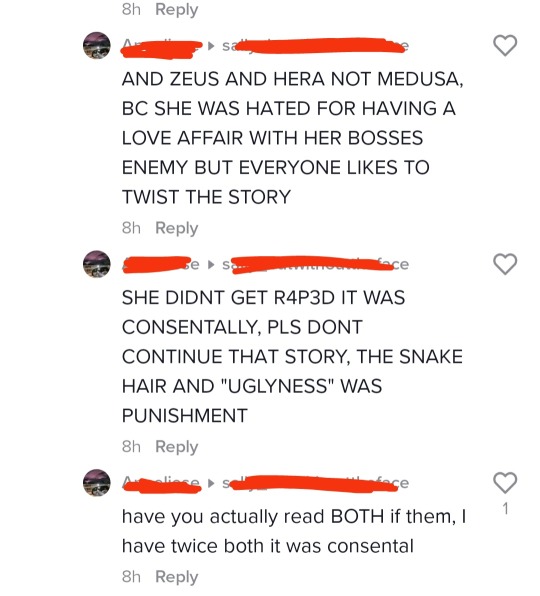
2 notes
·
View notes
Text
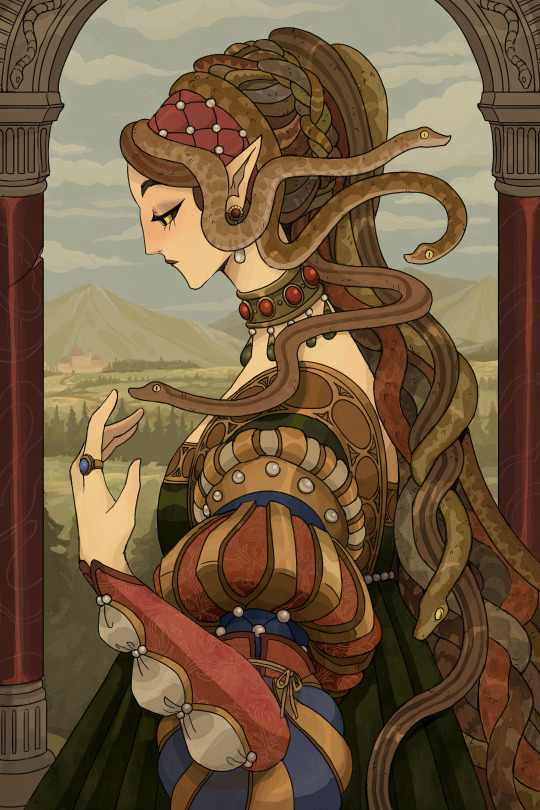
-Medusa-
I've had this sitting around as a sketch for awhile, finally had time to finish it! Hoping to do more mythology illustration this year.
53K notes
·
View notes
Photo
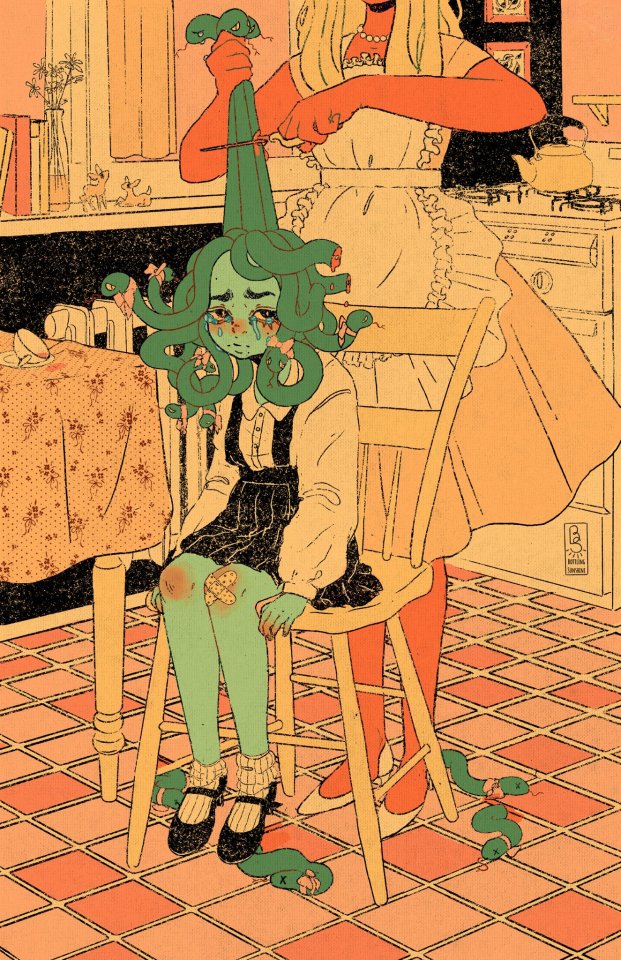
art by @BottlngSunshine
#Medusa#Gorgon#snakes#im not tagging this under 'monster girl'#because that would be creepy and gross#I just thought it was a cool drawing
58K notes
·
View notes
Text
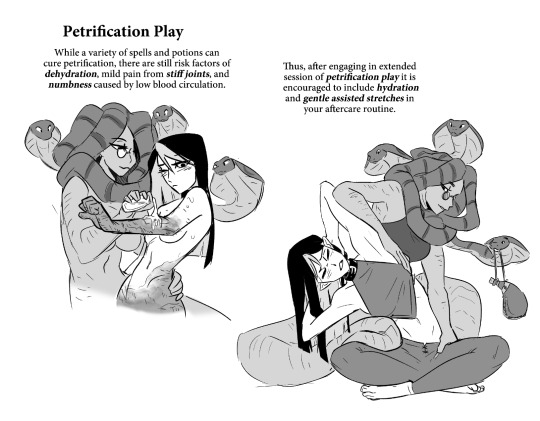

Gorgon Aftercare
From the notes of Monster Researcher Eclair. (Though Andie takes the lead on this particular research project.)
This is the bookend to the Gorgon comic
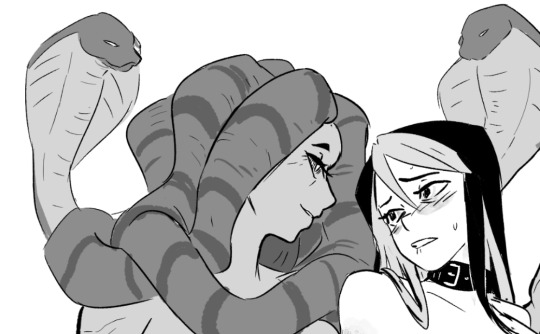
The spicy part that happens in between is too spicy for Tumblr and available on the patreon.
6K notes
·
View notes
Text
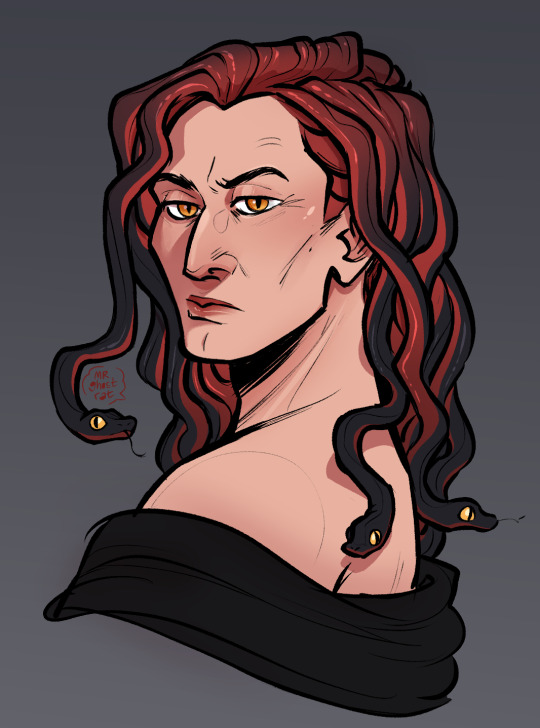
@asura-kairuko requested a gorgon crowley a while back! and this was the perfect thing to sketch at the end of today's work stream 😍 thank you everyone for coming todayyyy! [vod]
5K notes
·
View notes
Text
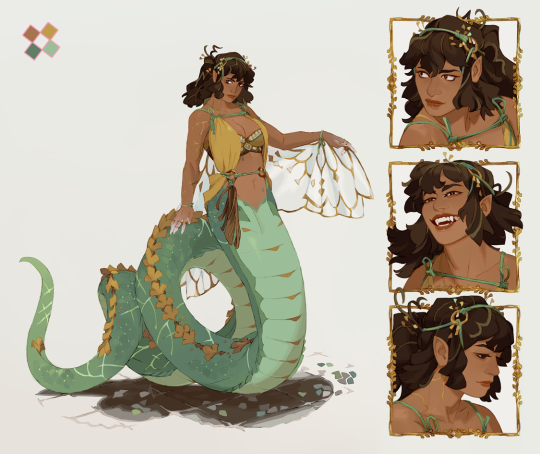
Character and commission belongs to Snejkha!
#character design commission#commission#paexie art#original character#naga#lamia#Valusians#snake people#gorgon#monster girl#snejkha#character sheet
5K notes
·
View notes
Text
The truth about Medusa and her rape... Mythology breakdown time!
With the recent release of the Percy Jackson television series, Tumblr is bursting with mythological posts, and the apparition of Medusa the Gorgon has been the object of numerous talks throughout this website… Including more and more spreading of misinformation, and more debates about what is the “true” version of Medusa’s backstory.
Already let us make that clear: the idea that Medusa was actually “blessed” or “gifted” by Athena her petrifying gaze/snake-hair curse is to my knowledge not at all part of the Antique world. I still do not know exactly where this comes from, but I am aware of no Greek or Roman texts that talked about this – so it seems definitively a modern invention. After all, the figure of Medusa and her entire myth has been taken part, reinterpreted and modified by numerous modern women, feminist activist, feminist movements or artists engaged in the topic of women’s life and social conditions – most notably Medusa becoming the “symbol of raped women’ wrath and fury”. It is an interesting reading and a fascinating update of the ancient texts, and it is a worthy take on its own time and context – but today we are not talking about the posterity, reinvention and continuity of Medusa as a myth and a symbol. I want to clarify some points about the ACTUAL myth or legend of Medusa – the original tale, as told by the Greeks and then by the Romans.
Most specifically the question: Was Medusa raped?
Step 1: Yes, but no.
The backstory of Medusa you will find very often today, ranging from mythology manuals (vulgarization manuals of course) to Youtube videos, goes as such: Medusa was a priestess of Athena who got raped by Poseidon while in Athena’s temple, and as a result of this, Athena punished Medusa by turning her into the monstrous Gorgon.
Some will go even further claiming Athena’s “curse” wasn’t a punishment but a “gift” or blessing – and again, I don’t know where this comes from and nobody seems to be able to give me any reliable source for that, so… Let’s put this out of there.
Now this backstory – famous and popular enough to get into Riodan’s book series for example – is partially true. There are some elements here very wrong – and by wrong I do mean wrong.
The story of Medusa being raped and turned into a monster due to being raped does indeed exist, and it is the most famous and widespread of all the Medusa stories, the one people remembered for the longest time and wrote and illustrated the most about. Hence why Medusa became in the 20th century this very important cultural symbol tied to rape and the abuse of women and victim-blaming. HOWEVER – the origin of this story is Ovid’s Metamorphoses, from the first century CE or so. Ovid? A Roman poet writing for Roman people. “Metamorphoses”? One of the two fundamental works of Roman literature and one of the two main texts of Roman mythology, alongside Virgil’s Aeneid. This is a purely Roman story belonging to the Roman culture – and not the Greek one. The story of Medusa’s rape does not have Greek precedents to my knowledge, Ovid introduced the element of rape – which is no surprise given Ovid turned half of the romances of Greek mythology into rapes. Note that, on top of all this, Ovid wasn’t even writing for religious purposes, nor was his text an actual mythological effort – he wrote it with pure literary intentions at heart. It is just a piece of poetry and literature taking inspiration from the legends of the Greek world, not some sort of sacred text.
Second big point: The legend I summarized above? It isn’t even the story Ovid wrote, since there are a lot of elements that do not come from Ovid’s retelling of the story (book fourth of the Metamorphoses). For example Ovid never said Medusa was a priestess of Athena – all he said was that she was raped in the temple of Athena. I shouldn’t even be writing Athena since again, this is a Roman text: we are speaking of Minerva here, and of Neptune, not of Athena or Poseidon. Similarly, Minerva’s curse did not involve the petrifying gaze – rather all Ovid wrote about was that Minerva turned Medusa’s hair into snakes, to “punish” her because her hair were very beautiful, and it was what made her have many suitors (none of which she wanted to marry apparently), and it is also implied it is what made Neptune fall in love (or rather fall in lust) with her. I guess it is from this detail that the reading of “Athena’s curse was a gift” comes from – even though this story also clearly does victim-blaming of rape here.
But what is very fascinating is that… we are not definitively sure Neptune raped Medusa in Ovid’s retelling. For sure, the terms used by Ovid in his fourth book of Metamorphoses are clear: this was an action of violating, sexually assaulting, of soiling and corrupting, we are talking about rape. But Ovid refers several other times to Medusa in his other books, sometimes adding details the fourth-book stories does not have (the sixth book for examples evokes how Neptune turned into a bird to seduce Medusa, which is completely absent from the fourth book’s retelling of Medusa’ curse). And in all those other mentions, the terms to designate the relationship between Medusa and Neptune are more ambiguous, evoking seduction and romance rather than physical or sexual assault. (It does not help that Ovid has an habit of constantly confusing consensual and non-consensual sex in his poems, meaning that a rape in one book can turn into a romance in another, or reversal)
But the latter fact makes more sense when you recall that the rape element was invented and added by Ovid. Before, yes Poseidon and Medusa loved each other, but it was a pure romance, or at least a consensual one-night. Heck, if we go back to the oldest records of the love between Poseidon and Medusa, back in Hesiod’s Theogony, we have descriptions of the two of them laying together in a beautiful, flowery meadow – a stereotypical scene of pastoral romances – with no mention of any brutality or violence of any sort. As a result, it makes sense the original “romantic” story would still “leak” or cast a shadow over Ovid’s reinvented and slightly-confused tale.
Step 2: So… no rape?
Well, if we go by Greek texts, no, apparently Medusa was not raped in Greek mythology, and only became a rape victim through Ovid.
The Ancient Greek texts all record Poseidon and Medusa sleeping with each other and having children, but no mention of rape. And the whole “curse of Athena” thing is not present in the oldest records – no temple of Athena soiling, no angry Athena cursing a poor girl… “No curse?” you say “But then how did Medusa got turned into a Gorgon”? Answer: she did not. She was born like that.
As I said before, the oldest record of Medusa’s romance but also of her family comes from Hesiod’s Theogony (Hesiod being one of the two “founding authors” of Greek mythology, alongside Homer – Homer did wrote several times about Medusa, but only as a disembodied head and as a monster already dead, so we don’t have any information about her life). And what do we learn? That Medusa is part of a set of three sisters known as the Gorgons – because oh yes, Ovid did not mention Medusa’s sister now did he? How did Medusa’s sisters ALSO got snake-hair or petrifying-gaze if only Medusa was cursed for sleeping with Neptune? Ovid does not give us any answer because again, it is an “adaptational plot hole”, and the people that try to adapt Ovid’s story have to deal with the slight problem of Stheno and Euryale needing to share their sister’s curse despite seemingly not being involved in the whole Neptune business. Anyway, back to the Greek text.
So, you have those three Gorgon sisters, and Medusa is said to be mortal while her sisters are not. Why is it such a big deal? Because Medusa wasn’t originally some random human or priestess. Oh no! Who were the Gorgons’ parents? Phorcys and Keto/Ceto, aka two sea-gods. Not just two sea-gods – two sea-gods of the ancient, primordial generation of sea-gods, the one that predated Poseidon, and that were cousins to the Titans, the sea-gods born of Gaia mating with Pontos.
So the Gorgons were “divine” of nature – and this is why Medusa being a mortal was considered to be a MASSIVE problem and handicap for her, an abnormal thing for the daughter of two deities. But let’s dig a bit further… Who were Phorcys and Ceto? Long story short: in Greek mythology, they were considered to be sea-equivalents of Typhon and Gaia. They were the parents of many monsters and many sea-horrors: Keto/Ceto herself had her name attributed and equated with any very large creature (like whales) or any terrifying monster (like dragons) from the sea. The Gorgons themselves was a trio of monsters, but their sisters, that directly act as their double in the myth of Perseus? The Graiai – the monstrous trio of old women sharing one eye and one tooth. Hesiod also drops the fact that Ladon (the dragon that guarded the golden apples of the Hesperids), and Echidna (the snake-woman that mated with Typhon and became known as the “mother of monsters”) were also children of Phorcys and Ceto, while other authors will add other monster-related characters such as Scylla (of Charybdis and Scylla fame), the sirens, or Thoosa (the mother of Polyphemus the cyclop). Medusa herself is technically a “mother of monsters” since she birthed both Pegasus the flying horse and Chrysaor, a giant. So here is something very important to get: Medusa, and the Gorgons, were part of a family of monsters. Couple that with the absence of any mention of curses in these ancient texts, and everything is clear.
Originally Medusa was not a woman cursed to become a monster: she was born a monster, part of a group of monster siblings, birthed by monster-creating deities, and she belonged to the world of the “primordial abominations from the sea”, and the pre-Olympian threats, the remnants of the primordial chaos. It is no surprise that the Gorgons were said to live at the edge of the very known world, in the last patch of land before the end of the universe – in the most inhuman, primitive and liminal area possible. They were full-on monsters!
Now you might ask why Poseidon would sleep with a horrible monster, especially when you recall that the Greeks loved to depict the Gorgons as truly bizarre and grotesque. It wasn’t just snake-hair and petrifying gaze: they had boar tusks, and metallic claws, and bloated eyes, and a long tongue that constantly hanged down their bearded chin, and very large heads – some very old depictions even show her with a female centaur body! In fact, the ancient texts imply that it wasn’t so much the Gorgon’s gaze or eyes that had the power to turn people into stone – but that rather the Gorgon was just so hideous and so terrifying to look at people froze in terror – and then literally turned into stone out of fear and disgust. We are talking Lovecraftian level of eldritch horror here. So why would Poseidon, an Olympian god, sleep with one of these horrors? Well… If you know your Poseidon it wouldn’t surprise you too much because Poseidon had a thing for monsters. As a sort of “dark double” of Zeus, whereas Zeus fell in love with beautiful princesses and noble queens and birthed great gods and brave heroes, Poseidon was more about getting freaky with all sorts of unusual and bizarre goddesses, and giving birth to bandits and monsters. A good chunk of the villains of Greek mythology were born out of Poseidon’s loins: Polyphemus, Antaios, Orion, Charybdis, the Aloads… And even his most benevolent offspring has freaky stuff about it – Proteus the shapeshifter or Triton half-man half-fish… So yes, Poseidon sleeping with an abominable Gorgon is not so much out of character.
Step 3: The missing link
Now that we established what Medusa started out as, and what she ended up as… We need to evoke the evolution from point Hesiod to point Ovid, because while people summarized the Medusa debate as “Sea-born monster VS raped and punished woman”, there is a third element needed to understand this whole situation…
Yes Ovid did invent the rape. But he did not invent the idea that Medusa had been cursed by Athena.
The “gorgoneion” – the visual and artistic motif of the Gorgon’s head – was, as I said, a grotesque and monstrous face used to invoke fright into the enemies or to repel any vile influence or wicked spirit by the principle of “What’s the best way to repel bad stuff? Badder stuff”. Your Gorgon was your gargoyle, with all the hideous traits I described before – represented in front (unlike all the other side-portraits of gods and heroes), with the face being very large and flat, a big tongue out of a tusked-mouth, snake-hair, bulging crazy eyes, sometimes a beard or scales… Pure monster. But then… from the fifth century BCE to the second century BCE we see a slow evolution of the “gorgoneion” in art. Slowly the grotesque elements disappear, and the Gorgon’s face becomes… a regular, human face. Even more: it even becomes a pretty woman’s face! But with snakes instead of hair. As such, the idea that Medusa was a gorgeous woman who just had snakes and cursed-eyes DOES come from Ancient Greece – and existed well before Ovid wrote his rape story.
But what was the reason behind this change?
Well, we have to look at the Roman era again. Ovid’s tale of Medusa being cursed for her rape at the hands of Neptune had to rival with another record collected by a Greek author Apollodorus, or Pseudo-Apollodorus, in his Bibliotheca. In this collection of Greek myths, Apollodorus writes that indeed, Medusa was cursed by Athena to have her beautiful hair that seduced everybody be turned into snakes… But it wasn’t because of any rape or forbidden romance, no. It was just because Medusa was a very vain woman who liked to brag about her beauty and hair – and had the foolish idea of saying her hair looked better than Athena’s. (If you recall tales such as Arachne’s or the Judgement of Paris, you will know that despite Athena being wise and clever, one of her main flaws is her vanity).
“Wait a minute,” you are going to tell me, “The Bibliotheca was created in the second century CE! Well after Greece became part of the Roman Empire, and after Ovid’s Metamorphoses became a huge success! It isn’t a true Greek myth, it is just Ovid’s tale being projected here…” And people did agree for a time… Until it was discovered, in the scholias placed around the texts of Apollonios of Rhodes, that an author of the fifth century BCE named Pherecyde HAD recorded in his time a version of Medusa’s legend where she had been cursed into becoming an ugly monster as punishment for her vanity. We apparently do not have the original text of Pherecyde, but the many scholias referring to this lost piece are very clear about this. This means that the story that Apollodorus recorded isn’t a “novelty”, but rather the latest record of an older tradition going back to the fifth century BCE… THE SAME CENTURY THAT THE GORGONEION STARTED LOSING THEIR GROTESQUE, and that the face of Medusa started becoming more human in art.
[EDIT: I also forgot to add that this evolution of Medusa is also proved by strange literary elements, such as Pindar's mention in a poem of his (around 490 BCE) of "fair-cheeked Medusa". A description which seems strange given how Medusa used to be depicted as the epitome of ugliness... But that makes sense if the "cursed beauty" version of the myth had been going around at the time!]
And thus it is all connected and explained. Ovid did invent the rape yes – but he did not invent the idea of Athena cursing Medusa. It pre-existed as the most “recent” and dominating legend in Ancient Greece, having overshadowed by Ovid’s time the oldest Hesiodic records of Medusa being born a monster. So what Ovid did wasn’t completely create a new story out of nowhere, but twist the Greek traditions of Athena cursing Medusa and Medusa having a relationship with Poseidon, so that the two legends would form one and same story. And this explains in retrospect why Ovid focuses so much on describing Medusa’s beautiful hair, and why Ovid’s Minerva would think turning her hair into snake would be a “punishment fit for the crime”: these are leftovers of the Greek tale where Medusa was punished for her boasting and her vanity.
CONCLUSION
Here is the simplified chronology of how Medusa’s evolution went.
A) Primitive Greek myths, Hesiodic tradition: Born a monster out of a family of sea-monsters and monstrous immortals. Is a grotesque, gargoylesque, eldritch abomination. Athena has only an indirect conflict with her, due to being Perseus’ “fairy godmother”. Has a lovely romance with Poseidon.
B) Slow evolution throughout Classical Greece and further: Medusa becomes a beautiful, human-looking girl that was cursed to have snake for hair and petrifying eyes, instead of being a Lovecraftian horror people could not gaze upon. Her conflict with Athena becomes direct, as it is Athena that cursed her due to being offended by her vain boasting. Her punishment is for her vanity and arrogant comparison to the goddess.
C) Ovid comes in: Medusa’s romance with Poseidon becomes a rape, and she is now punished for having been raped inside Athena’s temple.
[As a final note, I want to insist upon the fact that the story of Medusa being raped is not less "worthy" than any other version of the myth. Due to its enormous popularity, how it shaped the figure of Medusa throughout the centuries, and how it still survives today and echoes current-day problems, to try to deny the valid place of this story in the world of myths and legends would be foolish. HOWEVER it is important to place back things in their context, to recognize that it is not the ONLY tale of Medusa, that it was NOT part of Greek mythology, but rather of Roman legends - and let us all always remember this time Poseidon slept with a Lovecraftian horror because my guy is kinky.]
EDIT:
For illustration, I will place here visuals showing how the Ancient art evolved alongside Medusa's story.
Before the 5th century BCE: Medusa is a full-on monster



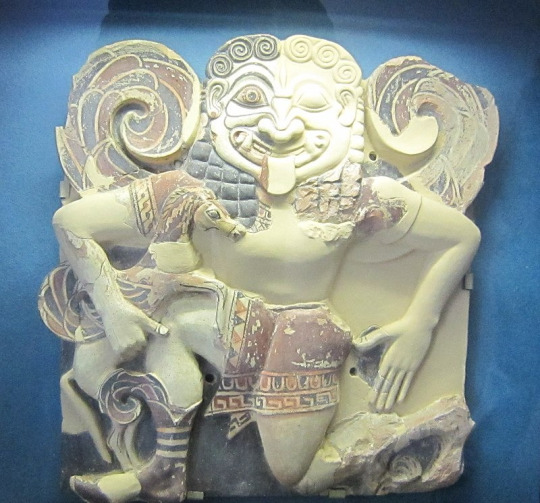


From the 5th century to the 2nd century BCE: A slow evolution as Medusa goes from a full-on monster to a human turned into a monster. As a result the two depictions of the grotesque and beautiful gorgoneion coexist.
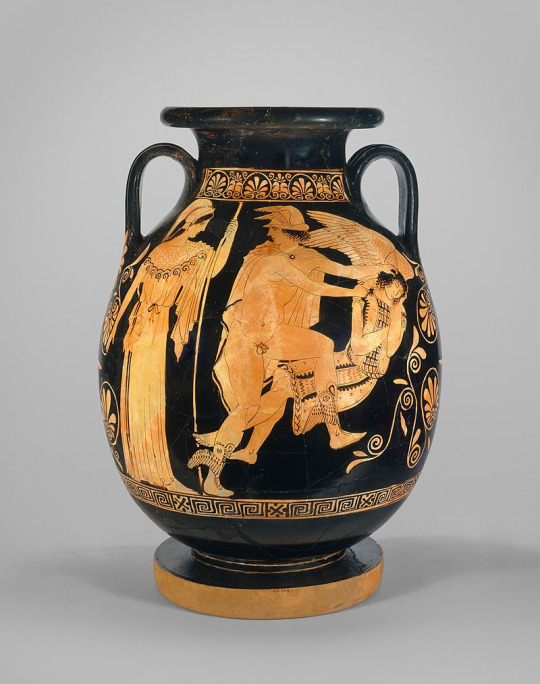


Post 2nd century BCE: Medusa is now a human with snake hair, and just that


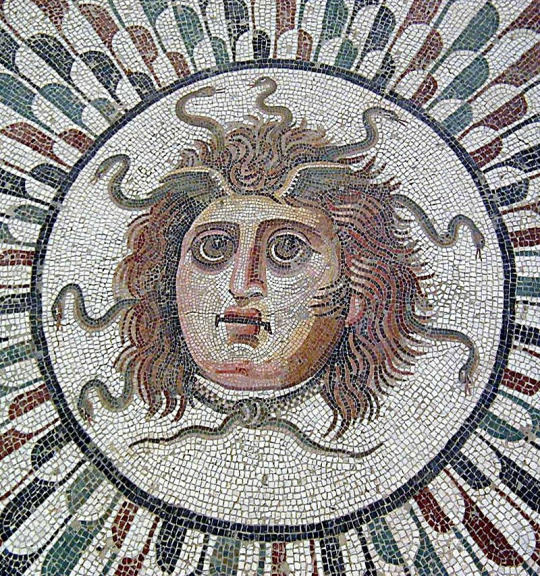
#greek mythology#medusa#gorgon#athena#gorgons#poseidon#neptune#minerva#ovid#rape in mythology#greek monsters#roman mythology
4K notes
·
View notes
Text
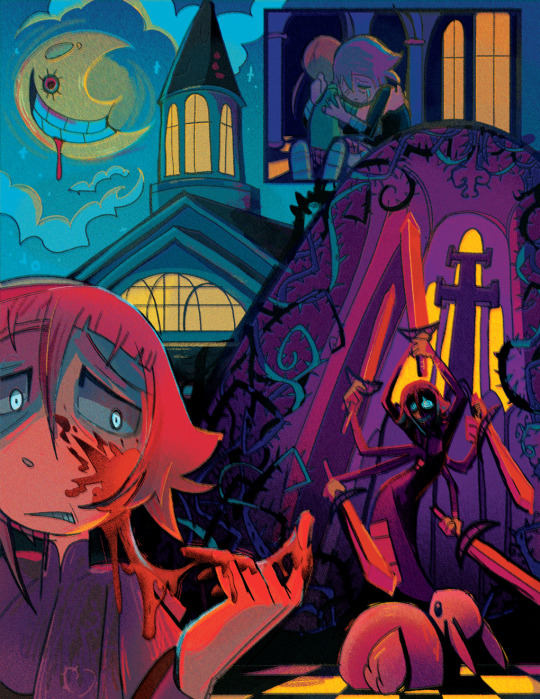
the madness of crona
4K notes
·
View notes
Text
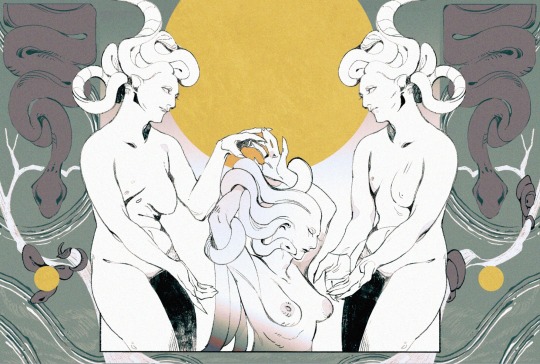
february postcard illustration! tried out sticking to a limited palette here hmmmm
patreon
#my art#gorgons#nudity#the return of laodike and artemisia...#one day ill be caught up on card illus again and actually post them when u can still sub to receive it....lol...#mastectomy
2K notes
·
View notes